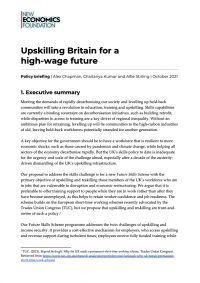Publications Upskilling Britain for a high-wage future A Future Skills Scheme will help workers and support the transition to a low-carbon economy By Alex Chapman, Chaitanya Kumar, Alfie Stirling 26 October 2021 Download the report Meeting the demands of rapidly decarbonising our society and levelling up held-back communities will take a revolution in education, training and upskilling. Skills capabilities are currently a binding constraint on
Topics:
New Economics Foundation considers the following as important:
This could be interesting, too:
Robert Vienneau writes Austrian Capital Theory And Triple-Switching In The Corn-Tractor Model
Mike Norman writes The Accursed Tariffs — NeilW
Mike Norman writes IRS has agreed to share migrants’ tax information with ICE
Mike Norman writes Trump’s “Liberation Day”: Another PR Gag, or Global Reorientation Turning Point? — Simplicius
Upskilling Britain for a high-wage future
A Future Skills Scheme will help workers and support the transition to a low-carbon economy
26 October 2021
Meeting the demands of rapidly decarbonising our society and levelling up held-back communities will take a revolution in education, training and upskilling. Skills capabilities are currently a binding constraint on decarbonisation initiatives, such as building retrofit, while disparities in access to training are a key driver of regional inequality. Without an ambitious plan for retraining, levelling up will tie communities to the high-carbon industries of old, leaving held-back workforces potentially stranded for another generation.
A key objective for the government should be to have a workforce that is resilient to more economic shocks, such as those caused by pandemics and climate change, while helping all sectors of the economy decarbonise rapidly. But the UK’s skills policy to date is inadequate for the urgency and scale of the challenge ahead, especially after a decade of the austerity-driven dismantling of the UK’s upskilling infrastructure.
Our proposal to address the skills challenge is for a new Future Skills Scheme with the primary objective of upskilling and reskilling those members of the UK’s workforce who are in jobs that are vulnerable to disruption and economic restructuring. We argue that it is preferable to offer training support to people while they are in work rather than after they have become unemployed, as this helps to retain worker confidence and job readiness. The scheme builds on the European short-time working schemes recently advocated by the Trades Union Congress (TUC), but we propose that upskilling and reskilling are front-and-centre of such a policy.
Our Future Skills Scheme programme addresses the twin challenges of upskilling and income security. It provides a cost-effective mechanism for employers, who access upskilling and revenue support during turbulent times; employees receive fully funded training while working part-time with a secure income; and the government sees progress against its objective of a high-skill, high-productivity and low-carbon economy.
We estimate our proposal could cost up to £26m a month for an illustrative 100,000 workers who are enrolled in the scheme from a range of target sectors. As we emerge from the pandemic, we argue that this is a small price to pay for a more resilient and skilled workforce.
Photo: iStock
Topics Work & pay Climate change




